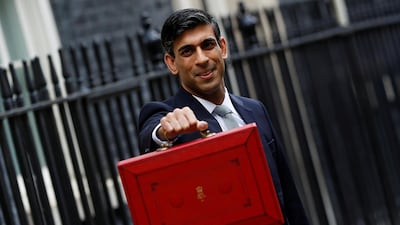British finance minister Rishi Sunak is expected to raise corporation tax to 25 per cent or higher at next week’s budget, a move that would keep the business levy competitive with other Group of Seven nations and in line with US President Joe Biden’s proposed tax policy.
Mr Sunak’s tax increase will see corporation tax rise sharply from its current rate of 19 per cent, according to media reports, which is the lowest in the G7. Rates in Canada, France, Germany, Italy and Japan are all above 25 per cent, while the US government proposed earlier this week to lift the US rate to 28 per cent from 21 per cent.
Officials working on the budget say Mr Sunak intends to make Britain’s business taxes “competitive” with other G7 countries, which is why rates could go to 25 per cent or above.
Paul Donovan, chief economist at UBS Global Wealth Management, said the US’s proposed increases "give the UK room to follow".
"The policy is a reverse of the 'race to the bottom' in corporate taxes. It might reflect a bigger shift as governments contemplate structural change and seek the appearance of equality to counter scapegoat economics and prejudice politics," Mr Donovan said.
If the US follows through on Treasury Secretary Janet Yellen's plans to raise corporation tax, it will give Mr Sunak scope to raise the UK rate by as much as six percentage points in the coming years. Each percentage point increase in corporation tax raises £3.3bn, according to the Financial Times.
The country would still have the lowest level of corporation tax in the G7, something former UK finance George Osbourne sought when he proposed cutting rates to less than 15 per cent in order to attract foreign investment.
Mr Sunak will unveil his spending plans on March 3 with the UK still in the midst of strict movement restrictions to contain the spread of Covid-19.
The budget presents a difficult challenge for Mr Sunak as he needs to find ways to revive the economy following a year of lockdowns, while also trying to restore public finances to sustainable levels.
Britain's economy has been pummelled by the Covid-19 crisis, with gross domestic product plunging 9.9 per cent last year in the worst economic slump in over 300 years, and UK public sector borrowing hitting £8.8 billion ($12.45bn) last month, according to the Office for National Statistics.
This takes total government borrowing to £270.6bn in the first 10 months of the fiscal year, with the Institute for Fiscal Studies saying Mr Sunak needs tax rises of about £60bn to balance the books following the Covid-19 crisis.
The think tank warned the March budget would be too soon to hit the economy with wide-ranging taxes, however, business leaders are less concerned about the prospect of a corporation tax rise, as it affects those making a profit rather than those still struggling.
"The chancellor faces a large budget deficit and he has to tackle it. Of all the options available, increasing corporation tax by relatively small percentages seems to me one of the least unattractive," Michael Heseltine, former Conservative minister and president of the Board of Trade, told the FT.
On Thursday, British think tank the Resolution Foundation said Mr Sunak should follow the US and roll out a £100bn pound stimulus push to support businesses and jobs in next week's budget - a smaller-scale version of the massive recovery plan announced by Mr Biden.
"While in the US debate has focused on President Biden's $1.9 trillion stimulus plan, the UK debate has got stuck on how to withdraw support," James Smith, research director at the Resolution Foundation, said.
"Instead, the Chancellor should combine extending existing support with fresh stimulus once restrictions are lifted to deliver a £100bn plan to boost Britain's recovery."


